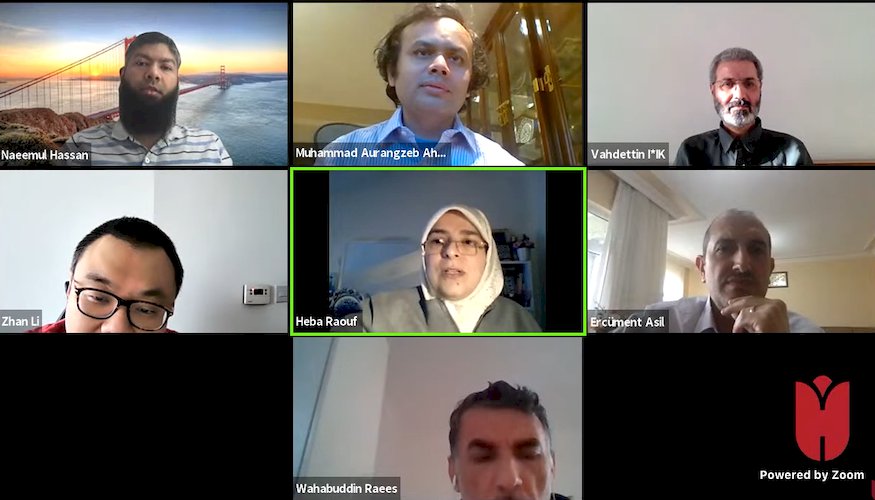


The Second Civilizations Forum was held online on May 1-2 under the theme of "Post-Human Age: Science, Technology and the Future of Civilizations." The forum discussed important and vital subjects touching on the future of civilizations from various aspects such as Posthumanism, Informatics, Technology, Media, Society, Philosophy and Anthropocentrism. It witnessed the participation of respected scholars and academics from all over the world; from Egypt to England, from Morocco to South Africa, from India to Austria, in addition to the faculty members of Ibn Haldun University (IHU). The Forum sessions were broadcast live on IHU’s corporate social media accounts and YouTube channel (https://www.youtube.com/ibnhalduni).
At the opening of the program, IHU’s President Prof. Atilla Arkan delivered a greeting speech. Reminding that the first of the forum series was held around the theme of "Protection of Civilization as a Purpose of Religion" in 2017, he stated that by these events IHU brings together representatives of different civilizations and prepare a platform for a discussion of current problems around certain themes standing in front of humanity. “As Ibn Haldun University, our intention from this forum is to manage the differences between civilizations and to create links and mutual understandings between them,” added Prof. Atilla Arkan.
Prof Arkan underlined that the turn of the century began with the birth of the World Wide Web, or Internet, which was central to the development of the Information Age. He added “Three decades later, and we are in a position in history where few ever thought we would be in. Indeed, the technology we have available today has brought many privileges that have not been witnessed before. However, metaphysical issues ranging from the cosmic to the ontological arise as a result of the post-human situation. Many of philosophy's central questions about reason, space, time, free will, language, and aesthetics will have to be reconsidered in the post-human era.”
He continued his speech wondering “If societies become too reliant on robotics and artificial intelligence, how can they deal with the emergence of new economic modes of production? Will millions of people become obsolete and essentially "useless" species, putting a strain on the force that manipulates and profits from technology? What effect would this have on social justice and stability?”
At the end of his speech, Prof. Atilla Arkan thanked the speakers and the organizers of the forum and said that Ibn Haldun University seeks to instil a certain set of values in its students, to ensure that the current generation and the ones to follow can play their part in guaranteeing a society in which justice is sought and where a balance is found.
In his speech, Vahdettin Işık, Director of the Alliance of Civilizations Institute (ACI), stated that the forum will be conducted concerning the civilization issues of technology, artificial intelligence, robots and other inventions that shape the human condition today and how they affect civilizations, and added: “In recent years, the pressure of scientific and technological changes has increasingly brought people’s doubt in their central and prominent positions and roles in the world, and even leaving these positions to the fore. The legal discussions that arise over artificial intelligence and robots as a "person" or even a "citizen" which its possibility to rule future societies is emphasized, point to the radical change in the role of the human species. A digital gap is increasingly separating nations and social spheres. This forum will address this and many other issues.”
After the welcome speeches, the opening session, moderated by Assist. Prof. Heba Raouf, witnessed each of Salah Khalil and Ahmad Abdulkader delivering presentations.
The first session titled “Conceptualizing Posthumanism” was moderated by Assist. Prof. Ercüment Asil, while the speakers were Syed Mustafa Ali, Khalid Mayar EIidrissi, Tuba Nur Umut, Nazan Yeşilkaya and Assist. Prof. Heba Raouf Ezzat.
Auwais Rafudeen and Safaruk Z. Chowdhury presented papers in the second session titled "Posthumanism and Transcendental" moderated by Prof. Bilal Aybakan.
The third session titled "Visibility and Media" was held under the moderation of Assist. Prof. Hakkı Öcal, Walid Magdy and Avishek Ray each gave presentations. Ana Peraica and Simone Natale were among the names who presented papers in the fourth session moderated by Assist. Prof. Nursem Keskin.
In the fifth session titled "Technology, Informatics and Society" moderated by Assist. Prof. Wahabuddin Raees, Mohamed Zahran and Aman Eid gave presentations.
Assist. Prof. Nagihan Haliloğlu undertook the moderation of the sixth session titled “Artificial Intelligence, Philosophy and Human Will”. Besides Enis Doko, Yusuf Ramos and Bager Akbay also presented papers in the session.
In the last session of the Second Civilizations Forum, "Post-Anthropocentrism" was discussed. In this session, chaired by Assist. Prof. Heba Raouf, Muhammad Aurangzeb Ahmad, Zhan Li and Naeemul Hassan each made presentations. The Second Civilizations Forum ended with the short evaluation presentation of Assist. Prof. Heba Raouf from the organizing committee.